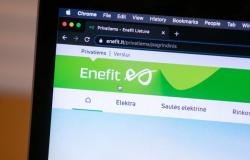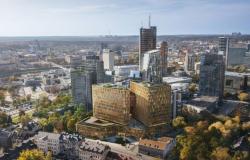Robertas Dačkus/LR Presidency photo.
Česlovas Iškauskas, political commentator, www.aidas.lt
in 2023 on March 28, that is, exactly one year ago, the Seimas adopted an important resolution no. XIV-1859, which, among other significant anniversaries for the state, declared 2024 as the commemorative year of NATO and the European Union. It is this spring that we mark the 20th anniversary of joining these transatlantic organizations.
So, in 2004 March 29 Lithuania became a full member of NATO. On the same day, the F-16 fighter jets of the Royal Belgian Air Force, which landed in Šiauliai, began to carry out the NATO air police mission. And Lithuania joined the EU a month later – in 2004. May 1st The inscription “European Union” appeared on Lithuanian passports. For an ordinary person, this meant not only pride, that after long decades of occupation recruits, Lithuania not only finally got rid of Soviet dependence, but also adapted to Western values and privileges, gained the right to use them.
In the formal texts, it is emphasized that 20 years of membership in NATO and the EU is a solid foundation from which Lithuania can resist and rise up, strive for more, see the overall picture and contribute to its creation. But as we welcome these important anniversaries, we do not forget an important question that should be considered – how will we continue to create a safe and prosperous future based on common democratic values with our allies NATO and the EU? And in response to ever-new emerging threats, how will we coordinate our actions to resist the aggressor?
What started it all?
This time, let’s focus more on joining NATO.
In democratic countries, it is common for a referendum to be held on every important issue, in other words, the citizens of the country are consulted. It has long been known that the most in the field of referendums is probably Switzerland, which holds several of them a year, well, for example, on keeping dogs in residential premises.
During the 34 years of independence, Lithuania has held a dozen plebiscites (five years ago, journalist Stasys Gudavičius of “Verslo žinios” counted 12 of them; the CEC lists thirteen of them on its website). The first of them was less than a year after the announcement of the March 11 act, when in 1991 February 9 a general survey of the population was held regarding the independence of Lithuania. 84.74 percent participated in the voting. of all registered voters at that time, i.e. more than 2 million of the country’s population, of which 90 percent voted for the provision that “the state of Lithuania is an independent democratic republic”. It later became the first article of the Constitution.
in 1992 even three referendums took place – on the restoration of the institution of the president, the withdrawal of Soviet troops from Lithuania as quickly as possible and the adoption of a new Constitution. The referendum on the withdrawal of the Soviet army and the general vote on the Constitution held together with the Seimas elections were successful – the proposed provisions were adopted in the parliament.
Another successful referendum took place only in 2003. on May 10-11. Then there was a vote on Lithuania’s accession to the European Union. It was the only referendum held on two consecutive days. This procedure is now prohibited by the Constitutional Court. Other referendums either did not take place due to low voter turnout, their consultative nature, or the irrelevance of the issue. True, the initiative of voting on Lithuania’s accession to NATO was not realized after all, because the creators failed to collect 300,000. voters’ signatures.
If, after all, such a referendum could have been held together with the 2003 in the January presidential elections, won by Rolandas Paksas, as journalist Valdas Saldžiūnas wrote in DELFI, everything could have turned out even more dramatically: what if Lithuanians had questioned the benefits of membership in the Alliance? If such a referendum was connected to the elections, as the politician of that time R. Karbauskis suggested, there was a danger that the supporters of NATO would not have collected 80% of the votes. of votes. After all, some of the 17 members of the founding initiative group for the preparation of the referendum openly contested the idea of rejoining “some kind of militaristic union”. They claimed that budgets for education, health care, culture, etc. would then suffer
The initiative to hold a referendum coincided with the NATO summit in Prague in November 2002, when Lithuania and other Baltic countries were invited to the Alliance, and after this event GW Bush visited Lithuania. While giving a speech in City Hall Square, the US President uttered his famous phrase: “Those who would choose Lithuania as their enemy would also become the enemy of the United States of America.” It would seem that this would only encourage the population to advocate for NATO. However, the initiators, determined to hold a referendum and at the same time skeptical about integration, did not manage to collect the necessary signatures. So the initiative failed. To renew it, when in 1994 Lithuania had already officially applied for the Alliance, no one else wanted to. V. Saldžiūnas claims that the dangerous period of the presidency of R. Paks and the scandal related to it also led to a high risk. According to the supporter of Eurointegration, Žygimantas Pavilionis, nobody managed to stop the process of joining NATO after Vytautas Landsbergis expressed in 1991 and after the agreement with Algirdas Brazauskas in 1994. the officially established NATO membership aspiration. But intrigue is brewing here.
Didn’t share the credit…
in 1994 January 4 On the eve of the summit of NATO countries in Brussels, the President of the Republic of Lithuania A. Brazauskas sent a letter to NATO Secretary General M. Wörner with a request to accept Lithuania, according to the 2022 report of the Ministry of National Defense. in the publication “Lithuania and NATO” prepared in March. This is a historical fact known to everyone, this is the real and official beginning of our integration into NATO, which is already ten years old. This goal was mentioned as early as the time of Sąjūdis, but there were no serious discussions or political steps until the new Constitution of the country, and then until the first direct presidential elections. And this is understandable, because there was simply another political agenda, the work of restoring one’s own independent state, the breathing of Russia on the back of the state. And a particularly difficult issue is the final withdrawal of foreign troops at the end of August 1993.
The aforementioned publication of the Ministry of Foreign Affairs was published to mark the decade of accession to NATO, that is, in 2014. in March, when the ministry was headed by one of the LSDP leaders, Juozas Olekas, who together with his previous colleague Gedimin Kirkilus wrote the introductory texts of the publication. So it goes without saying that politicians tried to hide the European integration merits of their opponents from the right, and first of all, the chairman of the Supreme Council – the Restorative Seimas, Prof. The contribution of Vytautas Landsbergis and other heralds of the Revival. I did not find the name of V. Landsbergis, who was then in parliament and was recently declared head of state, in the entire publication of almost 200 pages… Instead, A. Brazauskas’ strange thought is quoted: “Neutrality can be declared in one day,” wrote A. Brazauskas in his book “Five Years of the President”. “You need to enter the collective security system.” In other words, the adoption of the Act of Independence on that late night of March 11th is just an easy step, and breaking into Europe is an excruciating task…
And after all, in any reference book, we would find a note that already in 1990. November 17 The Baltic Information Office started operating in Brussels, where Rimantas Morkvėnas, the representative of the new Ministry of Foreign Affairs for Belgium, the European Community, and also for relations with NATO, worked. After the majority of Western countries recognized Lithuania’s independence, the Information Office in Brussels was transformed into an official representation. And half a year later, in 1991 on May 31, the unofficial prof. Visit of the delegation led by V. Landsbergis and the foreign ministers of Estonia and Latvia to the NATO headquarters. When it was not possible to organize an official meeting, the visit of the Lithuanian delegation to NATO headquarters was mediated by the Danish mission to NATO. It was a very important visit, and half a year later, in December, Lithuania joined the North Atlantic Cooperation Council.
Cornerstone of the contract
The 20th anniversary of our country’s accession to NATO coincides with the much older date of the founding of the Alliance itself – 1949. on April 4, when Belgium, Denmark, Great Britain, Iceland, Italy, USA, Canada, Luxembourg, Netherlands, Norway, Portugal, France signed the North Atlantic Treaty in Washington. In 1952, NATO began to expand even more. Then the Cold War, the nuclear competition was raging. No one even thought how important the 4th and 5th Articles of the Treaty would be in the future. The first provides for consultations between allies when at least one of them considers its territorial integrity, political independence or security to be threatened. The second one, which was repeated by US President GW Bush in Vilnius in one sentence that caused a huge ovation, meant the commitment of the members of the Alliance to defend each other in the event of a threat.
Let us repeat this 5th article as the Our Father:
“The Parties have agreed that an armed attack by one or more of them in Europe or North America shall be considered an attack on all of them, and have therefore agreed that, in the event of such an attack, each of them, in exercise of the right of individual or collective self-defense recognized by Article 51 of the Charter of the United Nations, will provide immediate assistance to foreign attacked or attacked countries, individually and jointly with other Parties, and will take such action as may appear necessary, including the use of armed forces.”
Tags: Lithuanias sticky road NATO
-





